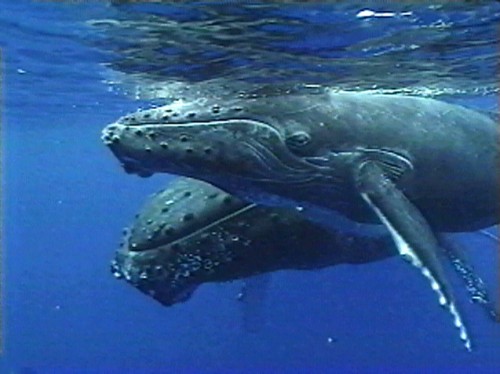Welcome to the Whale Facts & Protection Learning Section

WHALES - are the common name for various marine mammals of the order Cetacea. The term whale sometimes refers to all cetaceans, but more often it excludes dolphins & porpoises, which belong to the suborder Odontoceti (toothed whales). This suborder also includes the sperm whale, killer whale, pilot whale, and beluga whale. The other Cetacean suborder, Mysticeti (baleen whales), comprises filter feeders that eat small organisms caught by straining seawater through a comblike structure found in the mouth called baleen. This suborder includes the blue whale, the humpback whale, the bowhead whale & the minke whale. Cetaceans have forelimbs modified as fins, a tail with horizontal flukes & nasal openings (blowholes) on top of the head.
Whales range in size from the blue whale, the largest animal known to have ever existed at 30 m (98 ft) and 180 tonnes (180 long tons; 200 short tons), to various pygmy species, such as the pygmy sperm whale at 3.5 m (11 ft). Whales collectively inhabit all the world's oceans and number in the millions, with annual population growth rate estimates for various species ranging from 3% to 13%.
WHALING - Some species of large whales are listed as endangered by multinational organizations, such as CITES, as well as governments and advocacy groups; this is primarily due to the impact of whaling. Whales have been hunted commercially for whale oil, meat, baleen and ambergris (a perfume ingredient from the intestine of sperm whales) since the 17th century. At its peak, in 1846, the American whaling industry employed more than 70,000 people and 736 vessels. More than 2 million were taken in the 20th century, and by the middle of the century, many populations were severely depleted.
The International Whaling Commission banned commercial whaling in 1986. The ban is not absolute, however, and some whaling continues under the auspices of scientific research (sometimes not proved) or aboriginal rights; current whaling nations are Norway, Iceland and Japan and the aboriginal communities of Siberia, Alaska and northern Canada.
ANTI-WHALING - refers to actions taken by those who seek to end whaling in various forms, whether locally or globally in the pursuit of marine conservation. Such activism is often a response to specific conflicts with pro-whaling countries and organizations that practice commercial whaling and/or research whaling, as well as with indigenous groups engaged in subsistence whaling. Some anti-whaling factions have received criticism and legal action for extreme methods including direct action. The term anti-whaling may also be used to describe beliefs and activities related to these actions.
The most active anti-whaling organizations are Greenpeace and the Sea Shepherd Conservation Society, a direct action group focused on marine conservation, founded by Paul Watson a Canadian environmental activist.
WHALE PROTECTION - The Marine Mammal Protection Act of 1972 (MMPA) was the first act of Congress to call specifically for an ecosystem approach to natural resource management and conservation. It was signed into law on October 21, 1972 (and took effect 60 days later on December 21, 1972) by President Richard Nixon. MMPA prohibits the taking of marine mammals, and enacts a moratorium on the import, export, and sale of any marine mammal, along with any marine mammal part or product within the United States. The Act defines "take" as "the act of hunting, killing, capture, and/or harassment of any marine mammal; or, the attempt at such." The MMPA defines harassment as "any act of pursuit, torment or annoyance which has the potential to either: a. injure a marine mammal in the wild, or b. disturb a marine mammal by causing disruption of behavioral patterns, which includes, but is not limited to, migration, breathing, nursing, breeding, feeding, or sheltering." The MMPA provides for enforcement of its prohibitions, and for the issuance of regulations to implement its legislative goals.
We ask you to please donate to the Big MaMa Earth Learning Academy an environmental solution based non-profit. Your donations will be utilized for continuing education and support for “Whale Protection” and other important issues.
Please click the Icon’s below to view “Video’s” & “Photos”, review “Scientific Information” and be part of the “Solution”. “Your Future is NOW!”







